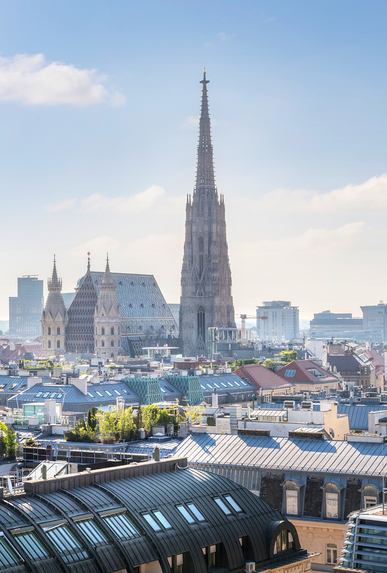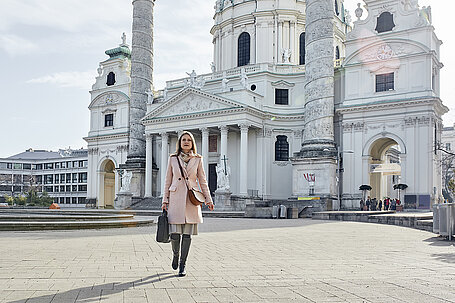

Students, researchers and artists
Studying (and working) in Austria
Austria is known as a renowned university location in Europe and around the world. There are more than 70 higher education institutions (universities, universities of applied sciences, etc.) and more than 2,000 courses of study. It is not only the quality of teaching and scholarship which is interesting to international students, but also Austria as a location in itself. Amongst many other reasons, Austria stands out due to its high quality of life and social security. As a result, it attracts a large number of students each year from all over the world.
Studying in Austria as an EU, Swiss or EEA national
As a general rule, EU/EEA and Swiss nationals can enter Austria without a problem. This is not dependent upon the specific country where you graduated from school.
In principle, secondary school diplomas from the EU, Switzerland and the European Economic Area are considered to have the same value as an Austrian secondary school diploma (“Matura”). However, if you graduated from a secondary school in another country, you may have to present additional documents in order to be permitted to study in Austria. Please clarify these prerequisites directly with the Austrian university where you intend to study.
Have you decided to study in Austria and now want to move here? Please consider the following points if you are an EU/EEA or Swiss national:
- You are required to register in the municipality you move to within the first three days of your stay in Austria. You are subsequently given a residence registration (“Meldezettel”) which you frequently need in Austria. For example, you need this residence registration at many universities when enrolling there.
- You have to register as an EU/EEA/Swiss national in the first four months after arriving in Austria. The certificate you apply for is called the Registration Certificate (“AnmeldebescheinigungAnmeldebescheinigung ()“).
You have to personally apply for the registration certificate at the Immigration and Residence Authority (“Aufenthaltsbehörde”). The location of this government office depends on where your place of residence in Austria is.
Costs: fee of € 15
The following documents must be taken to the competent Immigration and Residence Authority when applying for the Registration Certificate:
- Application formApplication form ()
- Valid passport or identity card
- Residence registration (“Meldezettel”) as proof of the place of residence in Austria
- Proof that you are studying in Austria (enrolment certificate – “Immatrikulationsbescheinigung”, up-to-date student record sheet – “Studienblatt”, etc.)
- Proof of sufficient means of subsistence (salary slips, bank account statements, etc.)
- Proof of health insurance coverage (Austrian e-card, European Health Insurance Card, etc.)
Note:
After residing in Austria for five years, you have the right to permanent residence (“Daueraufenthalt”). You can submit an application to the Immigration and Residence Authority for a document certifying permanent residence (“Bescheinigung des Daueraufenthalts”). For this purpose, you will have to be prove that you actually lived in Austria for at least five years and had health insurance coverage during this time. The Registration Certificate does not have an expiration date. You are not required to extend the certificate as long as you continue to fulfil the requirements.
Family:
Are you coming to Austria with your family? Please inform yourself on our website about the necessary steps and documents.
If you have a Registration Certificate or a Certificate of Permanent Residence, you can also apply for a "Photo ID for EEA citizens" at any time. This is the size of a credit card and can be used as an identity card. However, you are not obliged to apply for this identity card. The identity card is valid for five years.
Studying in Austria as a third-country national
You are allowed to study in Austria as a third-country national under certain conditions. It is important for you to find out if you fall under a special category, for which separate rules apply.
- Do you live in Austria, have a certain valid residence permitresidence permit (), for example a Red-White-Red – Card Plus, a Settlement Permit (“Niederlassungsbewilligung”) or a Long-Term Resident EU permit (“Daueraufenthalt EU”)? If you continue to fulfil the prerequisites for these residence permits, you are allowed to continue living, working and studying in Austria.
- Are you moving to live with your wife, husband, or civil partner in Austria or with this person to Austria? Is this person an EU/EEA or Swiss national? If this is the case, you can apply for a Residence Card (“AufenthaltskarteAufenthaltskarte ()”). This permit allows you to live, work and study in Austria.
- Are you moving to live with your life partner (“Lebenspartnerin/Lebenspartner” (unmarried) in Austria or with this person to Austria? Is this person an EU/EEA or Swiss national? If this is the case, you can apply for a Settlement Permit (“NiederlassungsbewilligungNiederlassungsbewilligung ()”). This enables you to live, work on a self-employed basis and study in Austria.
- Are you moving to live with your wife, husband or civil partner in Austria or with this person to Austria? Is this person an Austrian citizen? In this case, you can apply for the Residence Permit – Family Member (“Aufenthaltstitel FamilienangehörigerAufenthaltstitel Familienangehöriger ()”). In turn, this will allow you to live, work and study in Austria.
- Are you moving to live with your wife, husband or civil partner in Austria or with this person to Austria? Does this person have a Red-White-Red – Card (“Rot-Weiß-Rot – Karte”), an EU Blue Card (“Blaue Karte EU”) or a Settlement Permit – Researcher (“Niederlassungsbewilligung Forscher”)? Or does this person have a Red-White-Red – Card Plus (“Rot-Weiß-Rot – Karte Plus”) or a Long-Term Resident EU permit and previously had a Red-White-Red – Card, an EU Blue Card or a Settlement Permit – Researcher? In all these cases, you are eligible to apply for a Red-White-Red – Card PlusRed-White-Red – Card Plus (). This permit entitles you to live, work and study in Austria.
- Do you have a valid residence permit for students in another EU member state (except for Denmark and Ireland) and are taking part in a mobility programme (for example ERASMUS) in Austria? If you have sufficient health insurance and a confirmation of your participation in the mobility programme, you are allowed to stay and study in Austria for up to 360 days.
Do you not fall under any of these special categories? If this is the case, you can apply for a Residence Permit – Student (“Aufenthaltsbewilligung Student”). The Website of the OeAD - Austrian Agency for Education and InternationalisationWebsite of the OeAD - Austrian Agency for Education and Internationalisation () ("OeAD - Österreichische Agentur für Bildung und Internationalisierung") contains all the information you need about where you should apply for this residence permit, which documents you need, which prerequisites you must fulfil, what rules apply to your family and how you can extend your residence permit.
Working with a Residence Permit – Student
Do you have a Residence Permit – Student and would like to work in Austria at the same time? This is only possible under certain conditions. In principle, there are two possibilities:
- You work on a self-employed basis. In this case, you do not need any special permission. However, it is important that you are not in an employment relationship and that all legal requirements for self-employment are met. Otherwise, penalties may be imposed.
- You work as an employee with a company in Austria with a work permit (“Beschäftigungsbewilligung”).
In both cases, it is important that you continue to prove your success in your studies. Otherwise, you may encounter problems in the extension of your Residence Permit – Student.
The work permit (“BeschäftigungsbewilligungBeschäftigungsbewilligung ()”) is a permit that your employer has to apply for. You yourself are not entitled to apply for a work permit. You are only allowed to start working once your employer has received this permit from the Austrian Public Employment Service (“Arbeitsmarktservice” - AMS).
- Should you intend to work up to 20 hours per week, AMS checks if you have a valid Residence Permit – Student, and if your future employer submitted all other required documents. You also require a work permit if you only intend to work as a marginally employed person ("geringfügig beschäftigt"). Please note that if a work permit is only issued for up to 20 hours per week, no extra hours are permitted.
- Should you intend to work more than 20 hours per week, AMS may carry out a special procedure called labour market test (“Ersatzkraftverfahren”) to determine if there are other skilled workers already registered for the specific position. If a labour market test is carried out, it may take longer until you receive your work permit. Should suitable alternative candidates be found by AMS, they will be given priority over your application.
Note:
Are you studying at a public Austrian university or university of applied sciences, and plan to complete an internship (“Praktikum”) in your holidays in order to complement your university studies? Is this internship either compulsory or classified as an elective subject (“freies Wahlfach”) or is credited to your studies in some other way? In this case, your employer has to apply on your behalf to the AMS for a confirmation of your vocational internship (“Anzeigebestätigung”) at least three weeks before your internship is scheduled to begin. You do not need a work permit in this case. However, it is important that the university or university of applied sciences confirms that the internship will be credited to your studies and that the internship is in fact related to your studies.
The Residence Permit – Student is your actual residence permit. The work permit is only a confirmation that you are allowed to work in Austria. This means that you cannot get a work permit if you do not possess a valid residence permit. The purpose of your stay in Austria is first and foremost your studies. For this reason, your success in pursuing your studies is the most important factor for the Immigration Authority.
Working after a Student Residence Permit
Do you have a Residence Permit – Student and will soon conclude your studies in Austria?
For certain legally obligatory professional trainings after your studies in Austria, you can continue to receive a Residence Permit – Student for the duration of this activity. Examples f such trainings are the judicial practice after a law degree, the aspirant year after a pharmacy degree, or training in clinical psychology after a psychology degree.
In a first step, you can extend your Residence Permit – Student for one year after completing your studies or your compulsory professional training. During this year, you can look for a job in Austria. In the meantime, you can continue to work with a contract for work and labour (self-employed) or with a work permit (i.e., as an employed person).

This Residence Permit – Student is not the same as a Job Seeker Visa (“Jobsuche-Visum”). The Job Seeker Visa targets third-country nationals who are very highly qualified. An extension of the Residence Permit – Student is much more attractive because you already live in Austria.
If you receive a job offer after concluding your studies in Austria, you or your employer can apply for a Red-White-Red – Card for Graduates (“Rot-Weiß-Rot – Karte für StudienabsolventInnenRot-Weiß-Rot – Karte für StudienabsolventInnen ()”). This Red-White-Red – Card is the basis for your permanent and long-term stay in Austria. This particular Red-White-Red – Card is the most attractive option of all the six Red-White-Red – Cards, because as a graduate of an Austrian university, you have an Austrian education and thus make a particularly good fit to companies in Austria. Your family can also live with you in Austria and apply for the so-called Red-White-Red – Card PlusRed-White-Red – Card Plus ().
You have to fulfil the following prerequisites in order to receive this Red-White-Red – Card for Graduates:
- You successfully completed university studies in Austria. Only diplomas from state-owned universities or universities of applied sciences or from accredited private universities are recognised.
- You received a job offer from a company in Austria that corresponds to the educational level of academics. Your future employer must pay a salary according to the applicable collective bargaining agreement, additionally taking into account any overpayment which is customary locally and/or within the company (if applicable).
If you have not completed any degree in Austria, you are not eligible for the Red-White-Red – Card for Graduates. Instead, you can find out whether the EU Blue Card, the Red-White-Red – Card for Very Highly Qualified Workers, the Red-White-Red – Card for Skilled Workers in Shortage Occupations or the Red-White-Red – Card for Other Key Workers more closely matches your situation.
In any case, you will have to submit the following documents in order to receive a Red-White-Red – Card for Graduates:
- Application form
- Passport
- Passport photo fulfilling EU criteria (not older than six months)
- Qualification-related documents:
- Updated curriculum vitae (optional)
- Proof of successfully concluded studies (diploma, list of marks etc.)
- Employer documents:
- Employer’s Declaration (“ArbeitgebererklärungArbeitgebererklärung ()”)
- Job description, detailed (either as a separate document or in the Employer's Declaration)
- Information on the classification according to the applicable collective bargaining agreement (details may be included in the Employer’s Declaration; alternatively: submission of the work contract)
- Police Clearance Certificate (“Strafregisterbescheinigung”), if you do not live in Austria anymore, not older than three months
- Fees: 160
Please note the following:
- The validity of your Red-White-Red Card depends on how long your job offer is valid as well as how long your passport is still valid. If both are valid for at least two years, then your Red-White-Red Card is also valid for a period of two years.
- You will have to present one or more Police Clearance Certificates depending upon the country in which you live. Here you can see which Police Clearance CertificatesPolice Clearance Certificates () you will have to obtain. You do not have to present any Police Clearance Certificate if you still live in Austria.
- Personal documents must be specially legalised so that these documents are officially recognised. This depends upon the country in which the documents were issued. Here you can look to see which type of legalisation legalisation ()is necessary.
- If personal documents are not available in German or English, they must be translated by a court-certified translator (“gerichtlich beeidete Übersetzerin/beeideter Übersetzer”).
- If you have to show additional personal documents or if you need a Visa D, the fee to be paid may actually be higher than € 160.
Legal Foundations
- Registration Certificate (“Anmeldebescheinigung”): Sect. 51 ff Austrian Settlement and Residence Act (“Niederlassungs- und Aufenthaltsgesetz” - NAG)
- Student Residence Permit: Sect. 64 NAG
- Work permit (“Beschäftigungsbewilligung“): Sect. 4 Aliens Employment Act (“Ausländerbeschäftigungsgesetz“ - AuslBG)
- Red-White-Red – Card for Graduates: Sect. 41 NAG; Section 12b AuslBG
Working as a researcher in Austria
Are you a third-country national with a PhD or doctorate or Master's degree giving you access to a doctoral programme? Do you also have a long-term job offer (for a job lasting more than six months) for scientific work as a researcher for a recognised research facility in Austria? In this case, the so-called Settlement Permit – Researcher (“Niederlassungsbewilligung Forscher”) could be a suitable residence permit for you.
The Settlement Permit – Researcher targets third-country nationals who want to pursue scientific work for a research facility in Austria within the context of a specific research project after getting an advanced academic degree (at least a Master's enabling participation in a doctoral programme).
For this purpose, a hosting agreement (“Aufnahmevereinbarung”) between the research facility and the researcher must be concluded, amongst other prerequisites.
Note:
The OeAD - Austrian Agency for Education and InternationalisationOeAD - Austrian Agency for Education and Internationalisation () (“OeAD - Österreichische Agentur für Bildung und Internationalisierung”) provides comprehensive information and tailored advisory services for researchers and students on the issue of residence permits at no charge.
What is a research facility?
In any case, research facilities include all Austrian state-run universitiesAustrian state-run universities ().
Examples: University of Graz, Johannes Kepler University of Linz, University of Vienna
Private universities and private research facilities must be certified in order to be allowed to conclude a hosting agreement.
Examples: Paracelsus Medical University Salzburg (“Paracelsus Medizinische Privatuniversität Salzburg”) – a private foundation, Central European University – CEU, Institute for Human Sciences (“Institut für die Wissenschaften vom Menschen”), VRVis Zentrum für Virtual Reality und Visualisierung Forschungs-GmbH
Generally, research facilities operated by a state-run institution are exceptions to this rule and do not need their own certification in order to be able to conclude hosting agreements as a research facility.
Examples: I.S.T. Austria - Institute of Science and Technology – Austria, ACIB - Austrian Centre of Industrial Biotechnology, Kompetenzzentrum Holz GmbH


Note:
You can see all the certified research facilities and all research facilities which do not require certification on the list available on the website of the Austrian Federal Ministry of the InteriorAustrian Federal Ministry of the Interior (). However, the list of research facilities which do not require certification is by no means complete. As a rule, a university clinic which is part of a state-run medical university and carries out research projects can conclude a hosting agreement because it is operated by a state-run institution – even if it is not named on the list.
You must also receive a specified minimum salary because of your work at the research institution in order to be able to prove that you can cover the costs of your stay in Austria. Another option is to prove that you have other financial means at your disposal (e.g., private funds) to cover the costs of your being in Austria.
Is the Settlement Permit – Researcher not an option for you because, for example, you will not work for a recognised research facility? In this case, under certain circumstances (depending on your qualifications and planned activity), a Red-White-Red – Card or EU Blue CardRed-White-Red – Card or EU Blue Card () could be an attractive alternative for you.
Necessary documents
In any case, you need to present the following documents when applying for a Settlement Permit – Researcher:
- Application form
- Passport
- Passport photo fulfilling EU criteria (not older than six months)
- Police Clearance Certificate (“Strafregisterbescheinigung”), no more than 3 months old
- Work-related documents:
- Proof of successfully concluded studies (doctorate/PhD or university diploma providing access to the doctoral programs)
- Hosting agreementHosting agreement ()
- Fees: EUR 160
Validity, extension, family reunification
The period of validity of the Settlement Permit – Researcher is oriented to the particular hosting agreement (the agreed upon duration plus 3 additional months). However, it is valid for a maximum period of 2 years.
After these 2 years, you can obtain a Red-White-Red – Card PlusRed-White-Red – Card Plus (), which in turn gives you unrestricted access to the Austrian labour market. In this case, you are no longer bound to a specific employer and can freely decide whether you want to work as a salaried employee or on a self-employed basis.
If you have concluded your research work and have not been in Austria for 2 years, but would like to remain in the country, you can also extend your Settlement Permit – Researcher for a further 12 months for the purpose of looking for work or establishing your own company. In this case, you have to provide the Immigration Authority with proof that you have successfully concluded your research work to get this extension. Subsequently, you can only change over from the extended Settlement Permit – Researcher to a Red-White-Red – Card, an EU Blue Card, a Settlement Permit – Researcher or similar residence permits. You will not be allowed to apply for a Red-White-Red – Card Plus when you have an extended Settlement Permit – Researcher.
Are you immigrating to Austria with your family? Family members of researchers can apply for a Red-White-Red – Card PlusRed-White-Red – Card Plus (), granting them unrestricted access to the Austrian labour market. Your family members will be able to decide whether they want to work in Austria as salaried employees or on a self-employed basis.
Short stay in Austria as a researcher
If you would like to work as a researcher in Austria for less than 6 months, you can apply to the Austrian representative authority (embassy/consulate) in your country of residence for a Visa C for Gainful Employment (“Visum C zu Erwerbszwecken“ for stays of up to 90 days) or a Visa D for Gainful Employment (“Visum D zu Erwerbszwecken” for stays of between 91 days and a maximum of 6 months).
In any case, you will need a visa for gainful employment purposes if you want to work in Austria as a researcher, even if you are otherwise permitted to enter the country without a visa. You can begin your research work immediately after entering the country.
You can apply to the Austrian representative authority for a visa no earlier than 6 months before the planned date of entering the country but at least 4 weeks beforehand.
Notes:
If your future employer is a state-run university, a research facility operated by the state or a certified research facility, and this research facility presents the following documents on your behalf to the Austrian representative authority in your country of residence:
- a Declaration of Commitment (“Verpflichtungserklärung“)
- the employment contract (“Arbeitsvertrag”) and
- the contact addresses,
a simplified process is applied for your entering the country, staying within the country’s boundaries and the prompt commencement of work.
You will then promptly get a special appointment to appear before the Austrian representative authority and submit an application for the issuing of a visa for gainful employment (Visa C or Visa D). If the simplified process should also apply to your family members, the Declaration of Commitment must also encompass your family members too.
If you are already in the Schengen Area with a residence permit from another Schengen country, you can only apply for a visa to enter Austria to the Austrian representative authorities in Bratislava, Ljubljana and Munich.
Legal Foundation
Sect. 43c Austrian Settlement and Residence Act (“Niederlassungs- und Aufenthaltsgesetz” - NAG) (Settlement Permit – Researcher), Sect. 41a Para. 4 NAG (Red-White-Red– Card Plus in the extension process), Sect. 46 Para. 1 (1) NAG (Red-White-Red – Card Plus for Family Members)
Working as an Artist in Austria
When are you considered to be an artist?
You are considered to be an artist when you perform an activity in the field of art. For this purpose, you must be creative and artistic yourself and pursue this work on the basis of your artistic qualifications/aptitude. In any case, you are said to have artistic qualifications when you have completed your studies in art at a university or university of applied sciences.
The following professions are generally considered to comprise artistic activities:
- Sculptor
- Painter
- Drawer
- Curator
- Restorer
- Stage or set designer
- Interior decorator
- Fashion designer
- Artistic director
- Director or producer
- Quiz master or master of ceremonies
- Actress/Actor
- Announcer
- Singer
- Dancer
- Artist
- Musician
Even if you teach at an art college or art conservatory, you can be considered to be an artist. In this case, you can apply for a Residence Permit – Special Cases of Gainful Employment (“Aufenthaltsbewilligung Sonderfälle unselbständiger Erwerbstätigkeit”) or a Settlement Permit –Special Cases of Gainful Employment (“Niederlassungsbewilligung Sonderfälle unselbständiger Erwerbstätigkeit”) under certain circumstances.


If you work as an artisan (“Kunsthandwerkerin/Kunsthandwerker”) and only technically carry out or produce the designs or drafts of an artist but do not determine the artistic design yourself, you are not considered to be an artist. If you carry out work in applied arts and crafts and need artistic and handicraft skills to perform this work, you will usually need a trade license (“Gewerbeberechtigung”).
As a restorer, you can be considered to be an artist if you add to the existing work or restore it as a consequence of extensive damage and if you require artistic skills to do this work. In this case, you are involved in a kind of artistic performance. However, if you only carry out cleaning or conservation work on a work of art, the work is usually considered to be a commercial activity.
Types of gainful employment for foreign artists in Austria
If you would like to work as an artist in Austria for more than six months, you need a residence permit. The Settlement Permit – Artist (“Niederlassungsbewilligung – Künstler”) is particularly designed artists who do this work as their main activity.
Employed artist
If you want to work as an employed artist, you must present a written Employer's Declaration (“Arbeitgebererklärung”) in addition to your application for the issuance of a Settlement Permit – Artist. Your employer must declare their commitment to adhere to the employment conditions stipulated in the application. The application can be submitted to the Immigration Authority (“Aufenthaltsbehörde”) by your employer.
By the way, as an employed artist holding a Settlement Permit – Artist, you are entitled to additionally – but to a lesser extent – carry out self-employed activities.
Self-employed artist
If you apply for a Settlement Permit – Artist as a self-employed artist, you have to present the relevant contracts with contracting entities in Austria (galleries, theatres, concert halls, etc.) in addition to fulfilling the general prerequisites.
These contracts enable you to prove that you can live from the income derived from your artistic work. One precondition for being granted a Settlement Permit – Artist is that you achieve a certain economic success from your artistic work. A declaration of liability or other types of income which are not artistically motivated (e.g., rental income) are not considered sufficient to substitute for income derived from artistic work.
In principle, your artistic work must fulfil the following conditions:
- It must primarily involve tasks of an artistic nature.
- In principle, the income generated by this work must be sufficient to cover your costs of living. Specially justified, individual fluctuations in creative output and income can be taken into account (e.g., if exhibitions or performances had to be cancelled as a result of COVID-19).
Procedures
There are several options for applying to Austrian authorities for the residence permit before submitting the application. This depends on whether you want to do artistic work as an employed or self-employed artist.
If your plans call for salaried employment, your employer can also submit the application for the Settlement Permit – Artist on your behalf. This means you have the following options:
- Option 1: Your employer submits the application on your behalf to the Immigration Authority. This applies regardless of your nationality and the country in which you live at the present time. This option has the advantage that your application is submitted directly to the public authority which also processes your application. Moreover, this option usually allows you to submit certain documents per email at a later date (for example legalisations).
- Option 2: You submit the application to the Austrian representative authority (embassy/consulate) in your country of residence. If you select this option, your application has to be complete. As a rule, you are not permitted to send any missing documents afterwards via e-mail. Your application is then sent by diplomatic postal services from the representative authority to Austria. For this reason, the immigration process based on this option usually lasts much longer than with the first option.
- Option 3: If you are allowed to travel to Austria without a visa, you are permitted to personally submit your application to the Immigration Authority in Austria. This option has the advantage that the application is submitted directly to the public authority which actually processes it. Moreover, this option usually allows you to submit certain documents per email at a later date (for example legalisations).
Please pay attention to the number of visa-free days you are entitled to! Generally, you have 90 days (out of 180) in which you can stay in the Schengen Area. Once you have used up this allotment of visa-free days, you will no longer be allowed to submit the application in Austria because you no longer legally reside in the country. In this case, you must leave the Schengen Area and wait for the decision of the Austrian authorities abroad.
If you want to work as a self-employed artist, you must personally submit your application for a Settlement Permit – Artist. This means you have the following options:
- Option 1: You submit the application to the Austrian representative authority (embassy/consulate) in your country of residence. If you select this option, your application has to be complete. As a rule, you are not permitted to send any missing documents afterwards per e-mail.
- Option 2: If you are allowed to travel to Austria without a visa, you are permitted to personally submit your application to the Immigration Authority in Austria. This option has the advantage that the application is submitted directly to the public authority which actually processes it. Moreover, this option usually allows you to submit certain documents per email at a later date (for example legalisations).
Before you or your employer submit the application, you must have decided where you want to live in Austria. This is important because there is not only one branch of the Immigration authority in Austria, but many. Which of these branches is responsible for you depends on your future place of residence in Austria.
After you have submitted the application, you should not change your place of residence until the application is approved, because any change can lead to complications and delays in the procedure.
Please also note that you have to register your main residenceregister your main residence () after immigration to Austria and before picking up your Settlement Permit. This means that you already have to look for suitable accommodation during your application process.
In the application process, you have to show basic German language skillsGerman language skills () at an A1 level. Please keep the following in mind:
- At the time of your application, your German certificate must not be older than 1 year.
- In principle, only German certificates from the following institutions are accepted: Austrian Integration Fund (ÖIF), ÖSD, TELC and Goethe-Institut.
Artists who are striving to do the following artistic work do not have to prove any German language competence:
- artistic creation in literature, the performing arts, music, photography, film and video art as well as forms of art which are new and experimental or which transcend the boundaries of these art forms,
- the publication, presentation and documentation of works of art and
- the conservation of pieces of art and documents.
If you have completed your studies at a recognised university, you do not need to submit any proof of German language skills. Instead, it is sufficient to present your university diploma to the public authorities. Some diplomas require legalisations legalisations ()and translations into German or English by a court-certified translator.


During processing
As soon as you or your employer has submitted your application, various public authorities will evaluate your application. The Immigration Authority will check to see if you fulfil all the general prerequisites, for example if your passport is valid for a sufficient period of time or if all your documents have the correct legalisation. The Austrian Public Employment Service (“Arbeitsmarktservice” - AMS) will review the prerequisites under valid labour regulations. The AMS has four weeks to do this.
If the authorities doubt that the work specified in your application involves artistic work, they can request further proof from you.
If you are an internationally recognised artist and/or you can show that you have signed contracts with well-known theatres, concert halls, galleries etc., the public authorities do not have to further review your application.
At best, the review will end with the approval of your application.
After approval
All further steps depend on whether you are allowed to travel to Austria without a visa or not.
Are you allowed to enter Austria without a visawithout a visa ()? As soon as your application has been approved, you can come to Austria and have your fingerprints taken at the Immigration Authority. Furthermore, you will also have to show your original personal documents - passport, birth certificate, Police Clearance Certificate, etc.). Then, your Settlement Permit – Artist in the size of a credit card will be printed. You will only be allowed to begin working as soon as you receive the card.
Are you not permitted to enter Austria without a visa? In this case, after you have received approval, you will receive an invitation from the Austrian representative authority (embassy, consulate) in your country of residence. In this invitation, you will be asked to apply for a so-called Visa D within the following three months and to pick up your Settlement Permit – Artist in Austria within a period of six months. In order to receive a Visa D, you will need the following documents:
- Application form
- Passport with a copy
- Invitation of the representative authority
- Approval of the Immigration Authority
- Travel insurance (coverage of at least € 30,000, valid in the entire Schengen Area)
- Flight reservation
Generally, it will take about two weeks until the Visa D is stamped in your passport. During this processing time, the Austrian representative authority will keep your passport. As soon as you have your Visa D, you can travel to Austria and have your fingerprints taken. Furthermore, you will also have to show your personal documents (passport, birth certificate, Police Clearance Certificate, etc.). Your Settlement Permit – Artist in the size of credit card will then be printed. You will only be allowed to begin working as soon as you receive the card.
Validity, extension, family reunification
The Settlement Permit – Artist is issued for a period of one year. Afterwards, you can extend your Settlement Permit – Artist for another year (first extension).
Within the context of the second extension extension ()(after residing in Austria for two years), the Settlement Permit – Artist can be issued for another three years. After residing in Austria for five years, you can receive the Long-Term Resident EU permit (“Daueraufenthalt EUDaueraufenthalt EU ()”) in your third extension.
In every extension procedure involved in issuing a Settlement Permit – Artist, the Austrian authorities will check to see if you continue to fulfil all requirements.
Your family members can receive a Settlement Permit (“NiederlassungsbewilligungNiederlassungsbewilligung ()”). However, this is only possible when all requirements have been fulfilled and quota places are available.
Short-term artistic work
If you work as an artist in Austria for up to six months, you do not need any residence permit at all. A Visa C (for work of up to three months) or a Visa D (for work of up to six months) is sufficient. Under certain (very narrowly defined) circumstances, you will not need any visa for your artistic work.
Visa-free work
For your short-term artistic work in Austria, you are permitted to enter the country and carry out your work in Austria without a visa if you meet the following conditions:
- You are generally allowed to travel to Austria without a visawithout a visa () due to your nationality or because you live in a Schengen country and have a valid residence permit.
- You are not self-employed (i.e., as a rule you are employed) as
- a concert or stage artist or
- belong to a professional group of artists, filmmakers, radio or television employees or musicians.
- You fall within the scope of a visa-free stay in Austria:
- for one day (for example to give a concert or perform) or
- for up to eight weeks within the context of an overall artistic production to ensure the implementation of a concert, event, performance, ongoing film production or a live radio or television broadcast.
Note
An overall artistic production is considered to be an event or production with artistic contents based on an overall organisational concept (e.g., concert or theatre tour, total works of art, film shooting). The overall production can consist of several self-contained units (e.g., concerts or theatre performances). To serve its intended purpose, the special provision covers all foreign nationals participating in the overall production, even if their individual work is not of an artistic nature.
In this case, the employment of these people must be reported to the regional office of the Austrian Public Employment Service (AMS) on the day work begins by the event organiser or producer. The event organiser or producer does not require a visa.
The general prerequisites for a visa-free stay in Austria (for up to 90 out of 180 days) applies. Please make sure that you have a sufficient number of visa-free days for your stay in Austria.
Visa C for Gainful Employment
You need a regular Visa C (without the addition of “Gainful Employment”) in the following situations:
- You would like to stay in Austria for up to three months.
- You generally need a visa visa ()in order to travel to Austria due to your nationality.
- You are not self-employed (i.e., as a rule you are employed) as
- a concert or stage artist or
- belong to a professional group of artists, filmmakers, radio or television employees or musicians.
- You fall within the scope of a stay in Austria as covered by the visa:
- for one day (for example to give a concert or perform) or
- for up to eight weeks within the context of an overall artistic production to ensure the implementation of a concert, event, performance, ongoing film production or a live radio or television broadcast.
You need a Visa C for Gainful Employment (“Visum C für Erwerbszwecke“), an AMS guarantee that the work permit will be issued in the near future (“Sicherungsbescheinigung”) and a work permit (“Beschäftigungsbewilligung”) when you are employed and
- you do not work as a concert or stage artist or belong to a professional group of artists, filmmakers, radio or television employees or musicians or
- you want to work longer than one day or up to eight weeks within the context of an overall artistic production.
- Furthermore, you also require a Visa C for Gainful Employment if you work on a self-employed basis.
- One thing always applies: A Visa C can only be issued for a maximum of 90 days within a period of 180 days.
Visa D for Gainful Employment
You need a regular Visa D (without the addition of “Gainful Employment”) in the following situations:
- You would like to stay in Austria for a period of three to six months.
- You are not self-employed (i.e., as a rule you are employed) as
- a concert or stage artist or
- belong to a professional group of artists, filmmakers, radio or television employees or musicians.
- You fall within the scope of a stay in Austria as covered by the visa:
- for one day (for example to give a concert or perform) or
- for up to eight weeks within the context of an overall artistic production to ensure the implementation of a concert, event, performance, ongoing film production or a live radio or television broadcast.
You require a Visa D for Gainful Employment if you work on a self-employed basis.
You can stay in Austria for up to six months with a Visa D.
You need a Visa D for Gainful Employment (“Visum D für Erwerbszwecke“), a conditional assurance or confirmation of guaranteed work (“Sicherungsbescheinigung”) and a work permit (“Beschäftigungsbewilligung”) when you are employed and
- you do not work as a concert or stage artist or belong to a professional group of artists, filmmakers, radio or television employees or musicians or
- you want to work longer than one day or up to eight weeks within the context of an overall artistic production.
Special case: secondment
If an artist is seconded or posted from a company in a third country, the Austrian event organizer must apply for a permission of posting (“Entsendebewilligung” - for work lasting up to four months) or a work permit (“Beschäftigungsbewilligung” - for work lasting more than four months). Secondment refers to a situation where foreign companies which do not have operating headquarters in Austria post their staff to Austria to carry out a specific task. Such work is generally based on a contractual obligation, especially on a contract for work and labour.
In addition to a posting permit and a work permit, a Visa C or Visa D and potentially an AMS guarantee that the work permit will be issued in the near future may be necessary, depending on the planned duration of the artist’s stay in Austria.
An exception does exist for artists who are posted to Austria for cultural activities within the context of an intergovernmental cultural agreement (“zwischenstaatlichen Kulturabkommen”) or an ensemble guest performance (“Ensemblegastspiel”)which do not last for more than one week. For example, a guest performance by a foreign opera in an Austrian opera house is considered to comprise an ensemble guest performance.
In such cases, a posting permit and work permit are not necessary. The event organiser or institution in which the artistic works are to be performed must send a notification (“Anzeige”) to the AMS (the Austrian Public Employment Service). This notification must take place no later than on the day work begins.
The notification (announcement) must contain the following information about the artists who are posted:
- Names
- Dates of birth
- Citizenship(s)
- Type and duration of their work in Austria
- Duration of the services rendered within the context of the project (regardless of how long the artists are actually in Austria)
The entire posted staff is covered by the notification of the event organiser.
Artists whose work involves cultural activities within the framework of an intergovernmental cultural agreement or an ensemble guest performance (not lasting longer than one week):
- do not need a visa when they do not normally need a visa to travel to Austria because of their nationality or country of residence in the Schengen Area, or
- they need a (regular) Visa C/Visa D (without the addition of “Gainful Employment”) when they fall within the scope of the visa obligation because of their nationality.
Example
A company buys a work of art of a Japanese artist which it wants to install at its corporate headquarters in Austria. For warranty reasons, it is agreed that the artist herself and two of her Japanese employees will install the work of art. The work is expected to last for one week. For this purpose, the Austrian company needs permission of posting for the employees. The prerequisite for granting this is that the remuneration which the Japanese employees receive for the work done in Austria is in line with Austrian labour regulations. After the company applies to the AMS for three posting permits and receives them, the artist and the employees can apply for a Visa C for Gainful Employment to the Austrian Embassy in Tokyo.
For employees who are posted to Austria in connection to the short-term rendering of services (business meetings, attending trade fairs and congresses, etc.), no work permit or posting permit is necessary. They
- do not need a visa when they do not normally need a visa to travel to Austria because of their nationality or country of residence in the Schengen Area, or
- they need a (regular) Visa C/Visa D (without the addition of “Gainful Employment”) when they fall within the scope of the visa obligation because of their nationality.
Multiple-entry visa
Under specified and precisely defined conditions, there is also the possibility to receive a Visa C for multiple entries to Austria with a longer period of validity (“mehrere Einreisen mit langer Gültigkeitsdauer” – up to five years).
For this purpose, you must show the necessity to frequently and/or regularly travel to Austria for professional reasons, and, in particular, prove your “integrity and reliability”. For example, this can be demonstrated by showing that you lawfully used past visa. Furthermore, your financial situation in the country of origin is examined as well as your intention to really leave the territory of the Schengen Area before the applied visa expires.
The basis for issuing such a “multi-year visa” can be found in the Visa Code (“Visakodex”).
Immigration Guide Austria
The online platform offers tailor-made answers to all your questions about living and working, residence, family reunification and employment of foreigners in Austria.